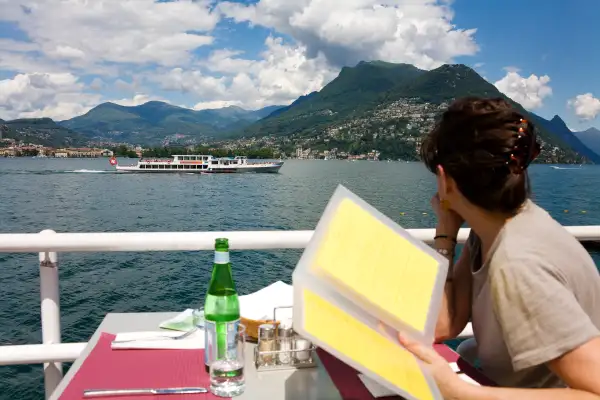Which Types of Food You Should NEVER Buy When Traveling Abroad — and Where to Find the Best Meals

Food is a massive part of any culture, so you want to plan your stops carefully when you travel abroad. Options are basically limitless once you step out of the airport terminal in many cities: You can navigate through the local specialties that educate you about life in a community or explore the fine-dining scene in an international metropolis like London. There are, of course, also the cheesy tourist traps and overpriced pitfalls. In an effort to help you get the most out of eating in a foreign country without maxing out your travel budget, we talked to Lauren Shockey, who wrote the book Four Kitchens about her experience cooking around the world. Here are her tips.
Get insider intel
Before a trip, Shockey “researches local food blogs and Yelp,” she says (she finds the photos of dishes on Yelp most helpful), in addition to more traditional sources like guidebooks and newspaper or magazine articles, though the latter can send you astray. “Given that restaurants open and close regularly and print publishing can take a year, the web has become a more reliable source for up-to-the-minute recommendations.” She’s also a member of LokaPack, which offers curated destination guides from industry experts and personalized suggestions (membership starts at $60 per year). If there’s someone in your life who loves food and traveling, ask them—nothing’s better than free advice.
Have pointed questions and real conversations
“If you’re using a hotel concierge, it's helpful to be as specific as possible, rather than saying, ‘I want Spanish food’ or ‘Anything sounds great,’” Shockey says. The same goes for anyone you meet. “If you know you like paella and that's what you want, state that you want a mid-priced restaurant that serves the city's best paella. Being clear and upfront about what you want is the best way to get help.”
Eat regional dishes, but be picky
“I like experiencing local cuisine as much as possible and will try to seek out amazing renditions of local fare,” Shockey says. “When I lived in Hanoi, Vietnam, I made it my mission to find the city's best bun cha, which is a dish of rice noodles with fresh herbs, pork patties, and fried spring rolls.” Whether it’s arrachera (skirt steak) tacos in Mexico or ramen in Japan, hunt down the ultimate version of whatever you’re craving, rather than the nearest vendor. Food-obsessed locals will know where to go, and it's often an affordable dive, especially for the quality.
Skip the familiar, unless you’re desperate for it
“I’d say avoid the food you can have at home, simply because you'd be missing out on having a one-of-a-kind culinary experience,” Shockey says. American-friendly foods that are in short supply in another country can come with an unnecessary premium—think outrageously priced steaks catering to high-roller travelers at Char in Shanghai. “But if you know that you love hamburgers and that will make you happiest while traveling, then by all means, have a hamburger! If you get anxious about having raw fish, then don't opt for sushi just because you're in Japan. Traveling is about experiencing new things, of course, but it's also about enjoying the moment fully. There's a reason why you see the same items on room service menus around the world: People crave comfort while traveling.”
Crowded places are good...
“A rule of thumb is to eat at restaurants that are very busy and look like they have high turnover,” Shockey says. Though it might seem superficial, those indicators matter. “You don't want to eat at a totally empty restaurant that doesn't seem that clean.” If there’s a line out of the door, it’s a sign that people are willing to spend time and money on a truly delicious meal.
...But tourist zones are not
“Avoid places that have menus posted outside advertising a ‘tourist menu,’” or displayed menus in several languages, Shockey says. Likewise, steer clear of any establishment with staff trying to hustle in vacationers on the sidewalk. While occasionally tourist specials “can be good deals, they’re often watered-down versions of local cuisine that have been made cheaply.”
Stock up on bottled water
“If water cleanliness is an issue” at your destination, Shockey says, “then you should be sure to drink bottled water. And make sure that the ice in your beverages has been purified as well.” Also be wary of fresh produce washed with tap water. It’s smart to buy cheaper water bottles in bulk at a large grocery store, since hotels and restaurants sometimes charge absurdly high prices for them. If food poisoning does strike, don’t freak out: There are solutions. “Have some Pepto Bismol and Imodium on hand just in case!”
Don’t get too thrifty
It’s tempting after unloading hundreds or even thousands on airfare to a faraway land to carefully budget yourself. You should by all means be smart with your spending, but keep in mind that you also want to maximize the experience you’re getting. “When I travel, I might splurge in a way that I wouldn't at home—usually on a decadent dinner,” Shockey says. “It makes me feel like I'm on vacation.” Which is, after all, the point.